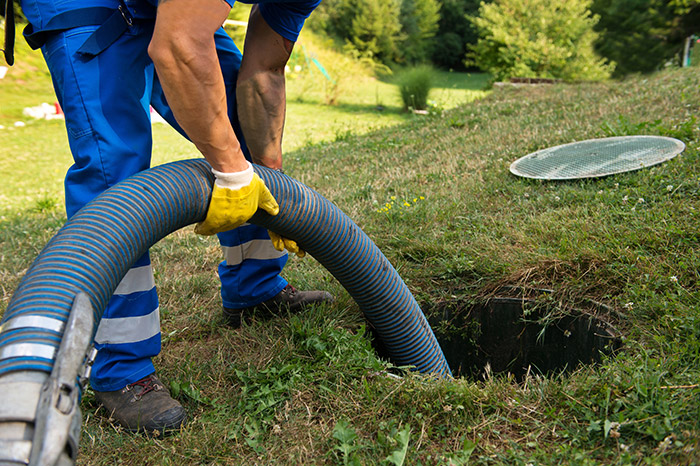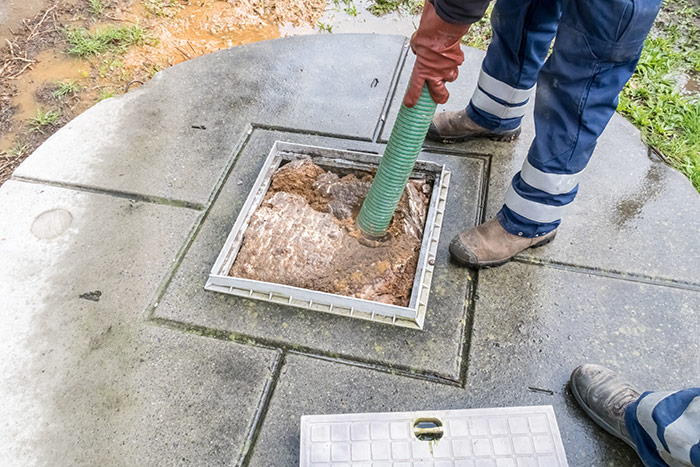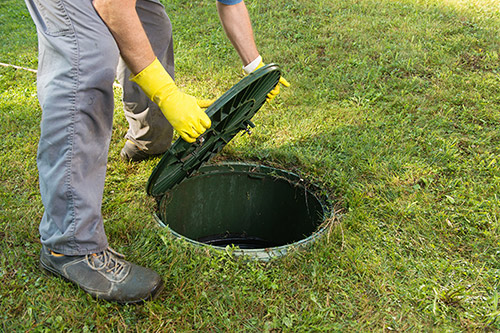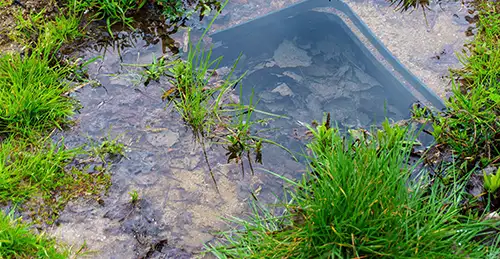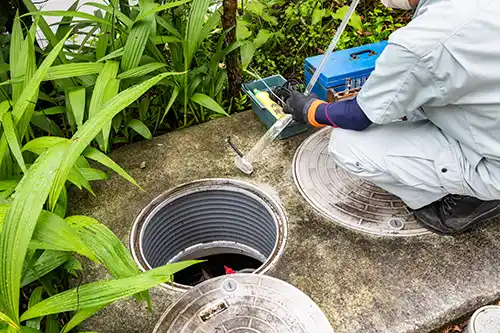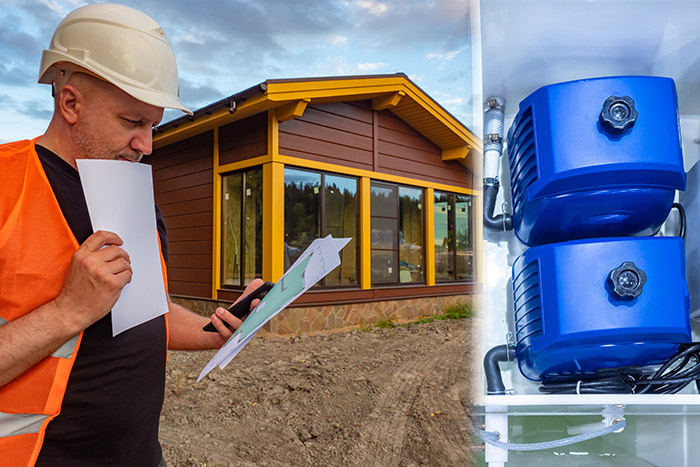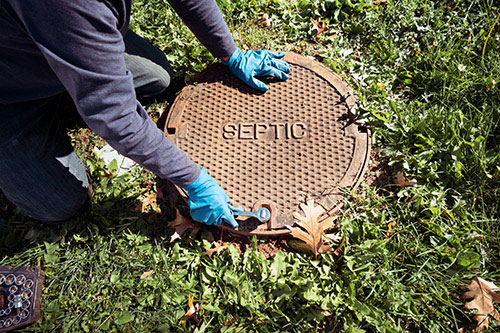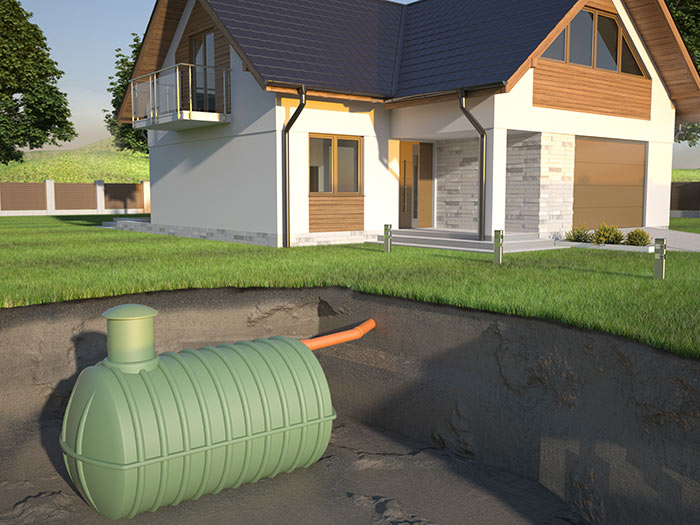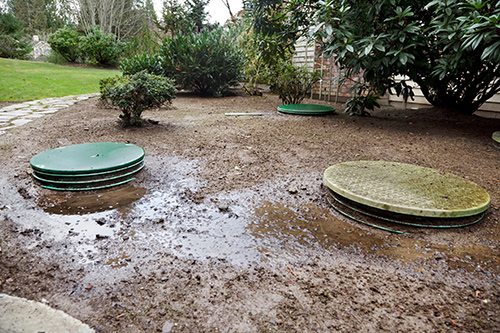
If the amount of wastewater entering the system is more than the system can
handle, the wastewater backs up into the house or yard and creates a health
hazard.
You can suspect a system failure not only when a foul odor is emitted but also when partially treated wastewater flows up to the ground surface. By the time you can smell or see a problem, however, the damage might already be done.
By limiting your water use, you can reduce the amount of wastewater your system must treat. When you have your system inspected and pumped as needed, you reduce the chance of system failure.
A system installed in unsuitable soils can also fail. Other failure risks include tanks that are inaccessible for maintenance, drainfields that are paved or parked on, and tree roots or defective components that interfere with the treatment process.
Failure symptoms
The most obvious septic system failures are easy to spot. Check for pooling water or muddy soil around your septic system or in your basement. Notice whether your toilet or sink backs up when you flush or do laundry. You might also notice strips of bright green grass over the drainfield. Septic systems also fail when partially treated wastewater comes into contact with groundwater. This type of failure is not easy to detect, but it can result in the pollution of wells, nearby streams, or other bodies of water. Check with a septic system professional and the local health department if you suspect such a failure.
Failure causes
Household toxics
Does someone in your house use the utility sink to clean out paint rollers or flush toxic cleaners? Oil-based paints, solvents, and large volumes of toxic cleaners should not enter your septic system. Even latex paint cleanup waste should be minimized. Squeeze all excess paint and stain from brushes and rollers on several layers of newspaper before rinsing. Leftover paints and wood stains should be taken to your local household hazardous waste collection center. Remember that your septic system contains a living collection of organisms that digest and treat waste.
Household cleaners
For the most part, your septic system’s bacteria should recover quickly after small amounts of household cleaning products have entered the system. Of course, some cleaning products are less toxic to your system than others. Labels can help key you into the potential toxicity of various products. The word “Danger” or “Poison” on a label indicates that the product is highly hazardous. “Warning” tells you the product is moderately hazardous. “Caution” means the product is slightly hazardous. (“Nontoxic” and “Septic Safe” are terms created by advertisers to sell products.) Regardless of the type of product, use it only in the amounts shown on the label instructions and minimize the amount discharged into your septic system.
Hot tubs
Hot tubs are a great way to relax. Unfortunately, your septic system was not designed to handle large quantities of water from your hot tub. Emptying hot tub water into your septic system stirs the solids in the tank and pushes them out into the drainfield, causing it to clog and fail. Draining your hot tub into a septic system or over the drainfield can overload the system. Instead, drain cooled hot tub water onto turf or landscaped areas well away from the septic tank and drainfield, and in accordance with local regulations. Use the same caution when draining your swimming pool.
Water Purification Systems
Some freshwater purification systems, including water softeners, unnecessarily pump water into the septic system. This can contribute hundreds of gallons of water to the septic tank, causing agitation of solids and excess flow to the drainfield. Check with your licensed plumbing professional about alternative routing for such freshwater treatment systems.
Garbage disposals
Eliminating the use of a garbage disposal can reduce the amount of grease and solids entering the septic tank and possibly clogging the drainfield. A garbage disposal grinds up kitchen scraps, suspends them in water, and sends the mixture to the septic tank. Once in the septic tank, some of the materials are broken down by bacterial action, but most of the grindings have to be pumped out of the tank. Using a garbage disposal frequently can significantly increase the accumulation of sludge and scum in your septic tank, resulting in the need for more frequent pumping.
Improper design or installation
Some soils provide excellent wastewater treatment; others don’t. For this reason, the design of the drainfield of a septic system is based on the results of soil analysis. Homeowners and system designers sometimes underestimate the significance of good soils or believe soils can handle any volume of wastewater applied to them. Many failures can be attributed to having an undersized drainfield or high seasonal groundwater table. Undersized septic tanks—another design failure—allow solids to clog the drainfield and result in system failure.
If a septic tank isn’t watertight, water can leak into and out of the system. Usually, water from the environment leaking into the system causes hydraulic overloading, taxing the system beyond its capabilities and causing inadequate treatment and sometimes sewage to flow up to the ground surface. Water leaking out of the septic tank is a significant health hazard because the leaking wastewater has not yet been treated.
Even when systems are properly designed, failures due to poor installation practices can occur. If the drainfield is not properly leveled, wastewater can overload the system. Heavy equipment can damage the drainfield during installation which can lead to soil compaction and reduce the wastewater infiltration rate. And if surface drainage isn’t diverted away from the field, it can flow into and saturate the drainfield.
For more information, contact Morse Engineering and Construction.
Source: EPA.gov
